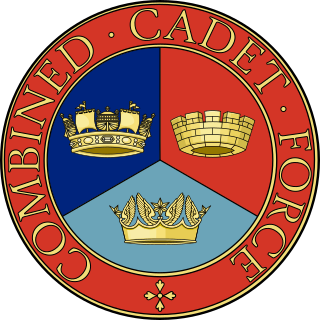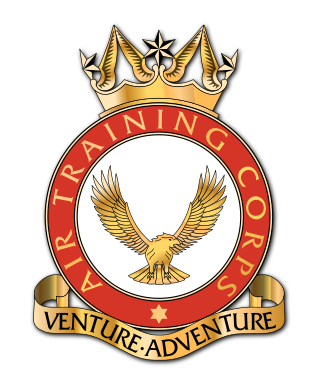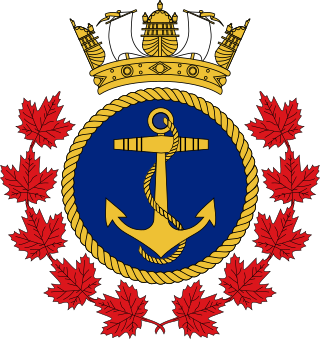Related Research Articles
Warrant officer (WO) is a rank or category of ranks in the armed forces of many countries. Depending on the country, service, or historical context, warrant officers are sometimes classified as the most junior of the commissioned officer ranks, the most senior of the non-commissioned officer (NCO) ranks, or in a separate category of their own. Warrant officer ranks are especially prominent in the militaries of Commonwealth nations and the United States.
Sergeant major is a senior non-commissioned rank or appointment in many militaries around the world.

The Combined Cadet Force (CCF) is a youth organisation in the United Kingdom, sponsored by the Ministry of Defence (MOD), which operates in schools, sub divided into Royal Navy, Royal Marines, Army and Royal Air Force sections. Its aim is to "provide a disciplined organisation in a school so that pupils may develop powers of leadership by means of training to promote the qualities of responsibility, self reliance, resourcefulness, endurance and perseverance".

The Air Training Corps (ATC) is a British volunteer youth organisation; aligned to, and fostering the knowledge and learning of military values, primarily focusing on military aviation. Part of the Royal Air Force Air Cadets (RAFAC), the ATC is sponsored by the Royal Air Force (RAF) and the wider Ministry of Defence (MoD). The majority of Air Training Corps staff are volunteers, though some staff are paid for full-time work; including Commandant Air Cadets, who is a Royal Air Force officer as part of a Full Term Reserve Service commitment.

The Army Cadet Force (ACF), generally shortened to Army Cadets, is a national youth organisation sponsored by the United Kingdom's Ministry of Defence and the British Army. Along with the Sea Cadet Corps and the Air Training Corps, the ACF make up the Community Cadet Forces. It is a separate organisation from the Combined Cadet Force which provides similar training within principally private schools.

Colour sergeant is a rank of non-commissioned officer found in several armies and marine corps.
Chief Warrant officer is a senior warrant officer rank, used in many countries.
Under officer is an appointment held by the most senior cadets at some Commonwealth officer training establishments and in University Officers' Training Corps in the United Kingdom, and also a rank used in some Commonwealth cadet forces.

A cap badge, also known as head badge or hat badge, is a badge worn on uniform headgear and distinguishes the wearer's nationality and/or organisation. The wearing of cap badges is a convention commonly found among military and police forces, as well as uniformed civilian groups such as the Boy Scouts, civil defence organisations, ambulance services, customs services, fire services etc.
Officer cadet is a rank held by military cadets during their training to become commissioned officers. In the United Kingdom, the rank is also used by members of University Royal Naval Units, University Officer Training Corps and University Air Squadron; however, these are not trainee officers with many not choosing a career in the armed forces.

"Other ranks" is the term used to refer to all ranks below officers in the British Army and the Royal Marines. It includes warrant officers, non-commissioned officers ("NCOs") and ordinary soldiers with the rank of private or regimental equivalent. Officers may, in speaking, distinguish themselves from those "in the ranks".

The Royal Canadian Sea Cadets is a Canadian national youth program sponsored by the Canadian Armed Forces and the civilian Navy League of Canada. Administered by the Canadian Forces, the program is funded through the Department of National Defence, with the civilian partner providing support in the local community. Cadets are not members of the Canadian Armed Forces.

The New Zealand Cadet Corps is one of the three corps in the New Zealand Cadet Forces, the other two being the Air Training Corps, and Sea Cadet Corps. There is no reference to the Army within the official title of the NZCC, but an army theme is used for the NZCC. All of its members, from the cadets themselves to the officers and the support committees are civilian volunteers. Members have no obligation to head into the New Zealand Defence Force (NZDF); however, some do choose to join the NZDF.
Like the British Army, the Australian Army does not use the term 'enlisted' to describe its non-commissioned ranks. Instead, personnel who are not commissioned officers are referred to as other ranks. These are soldiers, non-commissioned officers (NCOs) and warrant officers (WOs). Warrant officers are appointed by a warrant which is signed by the Chief of the Army. The insignia for non-commissioned ranks are identical to the British Army up to the rank of warrant officer class two. Since 1976, WO1s and the WO in the Australian Army wear insignia using the Australian Coat of Arms.

The Cayman Islands Cadet Corps (CICC) is a youth organisation in the Cayman Islands for male and female secondary school students between age 12 and 17. It was established in March 2002.

The Australian Army Cadets (AAC) is the youth military program and organisation of the Australian Army, tasked with supporting participants to contribute to society, fostering interest in defence force careers, and developing support for the forces. The program has more than 19,000 army cadets between the ages of 12 and 20 based in more than 200 units around Australia. The values of the AAC are "Service, Courage, Respect, Integrity and Excellence".
The Hong Kong Adventure Corps is a voluntary uniformed group subsidised by the Hong Kong government and the Hong Kong Jockey Club. It was created in 1995 with ties to the British Army's Army Cadet Force and Combined Cadet Force. Like the Hong Kong Sea Cadet Corps and Hong Kong Air Cadet Corps, the HKAC exists to serve the Hong Kong community. The HKAC's values are based in those of the British Army, providing a tough and challenging training with a distinctive military tone of discipline and esprit de corps.

A warrant officer (WO) in the British Armed Forces is a member of the highest-ranking group of non-commissioned ranks, holding the King's Warrant, which is signed by the Secretary of State for Defence.
The following table displays the ranks of the Community Cadet Forces, the Combined Cadet Force, the Volunteer Cadet Corps, and the Girls Venture Corps Air Cadets. This table is based on equivalent Rank Structures within the Cadet Forces as detailed in regulations of the SCC, RMC, and the Air Cadets.

Marine Academy Detachment is an Army Cadet Force Detachment situated within the school grounds of Marine Academy Plymouth. The Detachment is part of Devon ACF, B Company.
References
- ↑ The Army Cadet Force Manual. Ministry of Defence. pp. 5–1.
5.002. AI are voluntary youth workers appointed for service within the youth organisation that is the Army Cadet Force. For administrative convenience, they have similar conditions of service as part-time Crown Servants working for the Secretary of State for Defence; they are not members of the Armed Forces. An AI is not therefore subject to military law but is required to wear military uniform and rank while involved in ACF activities and is expected to act in accordance with the Values and Standards of the British Army. An AI carries out either general duties with the ACF or a specialist role by reason of possessing a special skill or qualification of use to the ACF.
- ↑ "Potential Instructors & Adult Instructors".
There are two routes of employment in the ACF; the adult leader without previous military experience would start as a probationary instructor denoted by the wearing on red shoulder boards and having attended and passed the Initial Training Course (a 7 day course normally held at Annual Camp or Preston) they would become a sergeant instructor. Promotion is available to sergeant major instructor, all of these levels are civilian based and their employment comes within a contract of employment.
- ↑ "ACF website".
The ACF isn't part of the Army. Okay, there are uniforms, traditions and badges of rank, but all adults in the ACF are essentially youth workers. And don't worry, there's no danger of military call-up.
- ↑ "Instructor Ranks". ACF.
Adult instructors who hold "non-commissioned officer" army ranks. On appointment you will be a Sergeant Instructor and there exists the opportunity to rise to Regimental Sergeant Major Instructor (RSMI). Along the way you are likely to be a detachment instructor and later a detachment commander. From there you will likely take responsibility for a number of detachments as a Company Sergeant Major before rising to the rank of RSMI where you will be the senior non-commissioned rank in your county!